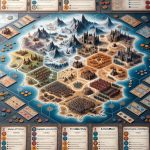Are you ready to conquer the Seven Kingdoms and claim the Iron Throne? In the intricate world of the Game of Thrones board game, having a solid opening strategy is key to securing victory. With its blend of diplomatic maneuvering, strategic warfare, and cunning alliances, this game offers players a thrilling experience like no other.
As fans of the beloved series immerse themselves in this tabletop adaptation, they are drawn to the complexity and depth of gameplay that mirrors the intricacies of Westeros. The Game of Thrones board game challenges players to navigate the treacherous political landscape, make tough decisions, and outmaneuver their opponents in a quest for power and control.
In this article, we will delve into the importance of crafting a smart opening strategy in the Game of Thrones board game. From choosing your house wisely to analyzing the map for strategic advantages, mastering the early stages of the game can set you on a path towards victory. Stay tuned as we explore tips and tactics for dominating your rivals and emerging triumphant in this epic battle for supremacy.
Overview of the Game
The Game of Thrones board game is a strategic and immersive tabletop experience that has captivated fans of the popular television series and book saga. With its complex gameplay, deep strategy, and unpredictable alliances, the game offers a challenging and engaging experience for players looking to step into the shoes of their favorite houses from Westeros.
The objective of the game is simple yet multifaceted: to conquer the most castles and fortresses across the Seven Kingdoms in order to claim the Iron Throne.
With three main phases – Planning, Action, and Cleanup – each round in the game presents players with difficult decisions that will impact their overall strategy and success. From deploying armies to consolidating power tokens, every move must be carefully considered to outmaneuver opponents and secure victory. The intricate mechanics of alliances, betrayals, and negotiations add layers of complexity to the game, making it crucial for players to stay vigilant and adaptable throughout.
In this dynamic environment where shifting allegiances can determine the course of battles and political intrigues are just as deadly as military conflicts, having a solid opening strategy is essential. The initial moves in the game set the tone for future interactions with other houses, establish key positions on the map, and lay the groundwork for resource management.
By understanding the unique strengths and weaknesses of your chosen house, analyzing strategic locations on the map, and fostering diplomatic relationships with other players, you can increase your chances of securing dominance in this high-stakes game of thrones.
| Gameplay Complexity | High |
|---|---|
| Main Phases | Planning, Action, Cleanup |
| Importance of Strategy | Essential for Success |
Importance of an Opening Strategy
When it comes to the Game of Thrones board game, having a solid opening strategy can make or break your chances of emerging victorious. The intense political intrigue, strategic warfare, and unpredictable alliances in the game require players to carefully plan their initial moves to establish a strong position early on. A well-thought-out opening strategy not only sets the tone for your gameplay but also influences your long-term success throughout the game.
Strategic Advantage
One of the main reasons why an opening strategy is so crucial in the Game of Thrones board game is that it provides you with a strategic advantage over your opponents. By carefully planning your initial moves and focusing on key objectives, such as seizing crucial territories or forming beneficial alliances, you can gain early momentum and set yourself up for success in the later stages of the game.
A strong opening strategy also allows you to adapt to unexpected developments and quickly pivot your plans if necessary.
Setting the Tone
Your opening moves in the Game of Thrones board game can significantly impact how other players perceive you and influence their decisions moving forward. By establishing yourself as a formidable force early on or projecting an air of diplomacy and cooperation, you can shape the dynamics of the game and steer it in your favor.
Additionally, a well-executed opening strategy can create opportunities for forging alliances with other players, securing valuable resources, and consolidating power within the realm. The choices you make at the beginning of the game will reverberate throughout its duration, making it essential to approach this phase with careful consideration and foresight.
Risk Management
Another key aspect of having a strong opening strategy in the Game of Thrones board game is risk management. By assessing potential threats and opportunities at the outset of the game, you can minimize risks, mitigate vulnerabilities, and capitalize on favorable situations.
Whether it involves defending your borders against hostile incursions, exploiting weak spots in your opponents’ defenses, or positioning yourself for future challenges, effective risk management plays a critical role in determining your success in Westeros. Balancing aggression with caution, seizing opportunities while minimizing exposure to danger, and staying adaptable are all essential components of a winning opening strategy in this intricate game of politics and warfare.
Choosing Your House
In the Game of Thrones board game, one of the crucial decisions players must make at the start of the game is choosing which house to control. Each house in the game comes with its own unique strengths and weaknesses, as well as a starting position on the map that can significantly impact your opening strategy. Understanding the characteristics of each house is essential for crafting a successful plan to navigate the treacherous waters of Westeros.
House Stark, known for their loyalty and honor, excels in controlling territories in the North where they can easily expand and fortify their positions. Their strong defense and ability to muster forces quickly make them a formidable opponent in battles. However, House Stark may struggle in expanding their influence beyond their stronghold, Winterfell, due to their geographical location.
On the other hand, House Lannister is renowned for their wealth and cunning political maneuvering. With access to significant resources and power tokens, House Lannister can quickly gain an advantage through strategic alliances and resource management. Their central position on the map allows them to project power in multiple directions but also makes them vulnerable to attacks from various fronts. Balancing aggression with diplomacy is key for House Lannister’s success.
House Baratheon boasts exceptional military strength and resilience on the battlefield. Their ability to call upon powerful knights and siege engines gives them a significant edge in offensive operations. However, House Baratheon may face challenges in maintaining control over distant territories due to limited mobility compared to other houses. Choosing House Baratheon requires a bold and aggressive approach from players willing to seize opportunities for conquest early on.
Map Analysis
Strategic Locations
One of the crucial aspects of developing a successful opening strategy in the Game of Thrones board game is understanding the strategic importance of different locations on the map. Certain areas provide valuable resources, such as power tokens or supply limits, while others offer defensive advantages. For example, controlling key strongholds and castles can yield significant benefits, both in terms of military strength and influence over territories.
House Specific Considerations
Each house in the Game of Thrones board game has its own unique strengths and weaknesses, which should inform your decision-making when it comes to map analysis. Some houses may have an advantage in certain regions or be better suited for specific types of strategies.
For instance, House Stark’s stronghold in Winterfell provides them with a solid defensive position in the North, while House Lannister’s proximity to King’s Landing gives them easier access to important political centers.
Adapting to Changing Dynamics
While identifying key locations on the map is essential for planning your opening moves, flexibility is also key to adjusting your strategy based on evolving circumstances during gameplay. Keep an eye on how other players are positioning themselves and be prepared to pivot if necessary. Forming temporary alliances or shifting focus based on changing power dynamics can help you stay ahead of your competitors and secure a strong position on the map.
By carefully analyzing the game board and strategically identifying key locations for each house to control during the opening phase, players can set themselves up for success in the Game of Thrones board game. Remember that adaptability and foresight are just as important as initial planning when it comes to executing a winning strategy. mastering this aspect of the game can give you a significant edge over your opponents from the very beginning.
Diplomacy and Alliances
When playing a Game of Thrones board game, the strategic element of diplomacy and alliances can make or break your opening strategy. Forming alliances with other players can provide you with valuable support, help in securing key locations on the map, and create opportunities for coordinated attacks against common enemies. However, it is important to approach diplomacy carefully as trusting the wrong player or misreading their intentions can lead to disastrous consequences.
To effectively navigate the complexities of diplomacy and alliances in the game, consider these tips:
- Observe your opponents: Take note of each player’s play style, preferences, and overall strategy. This information can help you gauge who might be open to forming an alliance and who could potentially be a threat.
- Communicate openly: Establish clear lines of communication with other players early on. Discuss potential alliances, joint strategies, and areas where cooperation could benefit both parties.
- Be cautious: While forming alliances is important, be wary of trusting too easily. Keep in mind that everyone is ultimately playing to win, and alliances can shift quickly based on changing circumstances on the board.
In addition to forming alliances, engaging in diplomacy with other players can also help you gather valuable information about their plans and intentions. By exchanging information strategically and leveraging it to your advantage, you can gain insights into potential threats, secure crucial support from allies, and adapt your opening strategy accordingly. Remember that in the game of thrones, trust is a rare commodity – use it wisely to further your own objectives while keeping a close eye on those around you.
Resource Management
In the Game of Thrones board game, effective resource management is key to achieving success and emerging victorious. During the early phases of the game, players must carefully allocate their resources, including power tokens, armies, and supply limits, to ensure they are in a strong position for the battles and challenges that lie ahead.
Power tokens are a vital resource in the Game of Thrones board game and can be used for a variety of purposes such as bidding for influence tracks, supporting orders, or mustering additional troops. It is essential to strategically collect and use power tokens early in the game to gain an advantage over your opponents. Players should consider how best to allocate their power tokens based on their current objectives and alliances to maximize their effectiveness.
Armies play a crucial role in controlling key areas on the map and defending against rival houses’ advances. Properly managing your armies by strategically positioning them on important territories can help secure your position while also deterring potential attacks from other players. Additionally, players should keep an eye on their rivals’ army movements to anticipate their strategies and react accordingly to maintain a strong defense or launch offensives when opportunities arise.
Lastly, tracking supply limits is essential as exceeding these limits can lead to severe consequences that could set back your expansion efforts significantly. By carefully monitoring your available supplies and adjusting your troop movements accordingly, you can prevent unwanted setbacks and maintain control over strategic locations on the map.
Concluding Thoughts
In conclusion, mastering the opening phase of the Game of Thrones board game requires strategic thinking, diplomacy, and resource management. As discussed earlier in this article, having a well-thought-out opening strategy is crucial for laying a strong foundation for success in the game. With the complexities of house selection, map analysis, alliances, and resource management, players must carefully plan their moves from the very beginning to gain an advantage over their opponents.
One key takeaway is to familiarize yourself with all the houses in the game and choose one that aligns with your playstyle. Each house has its unique strengths and weaknesses that can greatly impact your strategy in the opening phase. Understanding these dynamics can give you an edge when formulating your initial moves on the game board.
Furthermore, do not underestimate the power of diplomacy and forming alliances with other players. Building trust and cooperation can help secure key territories or fend off potential threats during the early stages of the game.
Remember to strike a balance between collaboration and competition to navigate through the treacherous political landscape of Westeros. By implementing these tips and recommendations, you can enhance your gameplay experience and increase your chances of emerging victorious in this epic battle for control of the Seven Kingdoms.
Frequently Asked Questions
What Is the Most Famous Strategy Board Game?
The most famous strategy board game is arguably Chess. Dating back to the 6th century, Chess is a game of skill, tactics, and foresight that has captivated players worldwide for centuries.
How Long Does Game of Thrones Board Game Take?
The Game of Thrones board game typically takes around 2 to 4 hours to play. This duration can vary depending on the number of players involved, their familiarity with the game rules, and their gameplay strategies.
How Does Game of Thrones Board Game Work?
In the Game of Thrones board game, players take on the roles of different noble houses vying for control of the Iron Throne in the fictional realm of Westeros. Through negotiation, diplomacy, and strategic warfare, players compete to expand their influence and claim victory points by controlling territories and fulfilling various objectives.
The game mechanics include army movement, area control, resource management, and political alliances to simulate the intricate power struggles depicted in George R.R. Martin’s epic series.

I love playing all kinds of games – from classics like Monopoly to modern favourites like Ticket to Ride.
I created this blog as a way to share my love of board games with others, and provide information on the latest releases and news in the industry.





